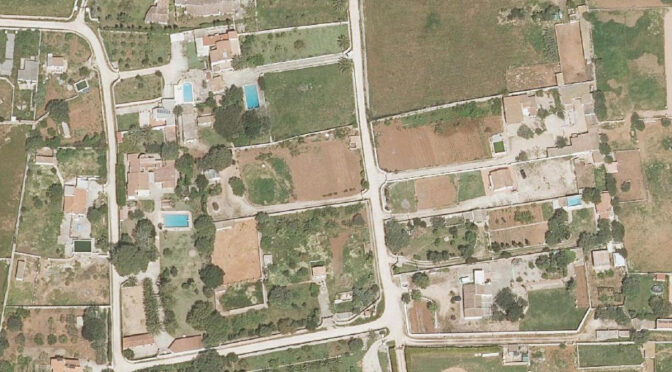Views: 1282
Rewarding urban offenders with a large increase in real estate value, and furthermore to have the Island Council public office help with these procedures, seems somewhat nonsensical and a provocation to those citizens who do things properly. Now is the time to analyse the problem of so-called vegetable gardens.
The problem of the misnamed vegetable gardens
The so-called vegetable gardens are the result of illegal plots of land that appeared in the eighties. A portion of rustic (no building allowed) land was divided up and the resulting plots sold off. The theory was that they were responding to people who wanted a “piece of land” for sowing a little vegetable garden. In practice, in many cases, they have finished by building houses illegally.
The resulting housing density with no sewerage means nitrate contamination. There are areas suffering from land degradation and, more recently, there is the added practice of housing rental to tourists without authorization.
To deal with this problem, during the nineties, rural nuclei appeared and the first two thousand were mapped. From then on, a legislation process was allowed if the property owners adhered to a Special Plan that deals with the problems of water supply, wastewater and access roads. Houses would be accepted up to 90 m2.
There are nuclei that have followed this process of legislation
Five nuclei have followed this process (3 in Maó, 1 in Sant Lluis, and 1 in Ferrereis). It is clear that the others (about 30) did not do it because they did not want to.
Within the same rural nuclei, it is common to find three types of situations. There is one that does have a vegetable garden, a shed for tools, and a hen house. There are some that have created a tool shed where they can stay to sleep. There are those that have built a large house, without paying for a licence, taxes nor technicians.
It is clear that it is quite different to have a house or land within an illegally defined area (that cannot have a mortgage nor is resale guaranteed for the buyers) from where it is legal. Logically, the value of the property multiplies.
However, those that have built large houses are slowing down the legalization process because they do not want to reduce the size of the house they have built. These people have started campaigning.
They are not vegetable gardens, they are large illegal houses
We are faced with a collective that presents itself as an association of vegetable garden property owners but, in reality, it is an association of property owners of large illegal houses.
It is an association that considers it unfair not to be allowed to legalise entirely the large dimensions of chalets constructed on non-building land. They present themselves as victims of land planning that “only” allows legalising buildings up to 90 m2.
They seem to forget that many homes on urban land are not more than 90 m2, where people live who are concerned to have a house in a legal area, where they have paid taxes, where public services are allowed and that have contracted technicians to guarantee the solidity, health and safety of the buildings.
The public processing is insulting
The current team of the Island Governing Council has made two worrying announcements on this matter. One is that they want to revise the maximum size of buildings allowed in rural nuclei. Presumably, they also consider that any illegal construction of a home of 90 m2 is of little consequence.
The other announcement is that they wish to create a public office to help process the special plans for the vegetable gardens. That means that now they intend to allocate public money for allowing the property owners of illegal large houses to make their properties legal and, therefore, able to multiply their real estate value.
We need to ask ourselves at what point the Island Council ceases to be a public organ for planning and turns into an agency working in favour of those who commit offences.
Acts of this style are insulting to the citizens who do things correctly, who love the island, who know that Menorca is different because of the hard work they have done to avoid carving out land for private benefit.
Channel outrage
Current legislation allows addressing the issue of the vegetable gardens with tool sheds that are converted into small houses. However, it is not able to solve the problem of those that have built large houses on rustic land. Understanding the difference is essential for this argument.
To see the main Island public administration lending itself to this game creates disenchantment. It also causes outrage. Indignation will have to be channelled by detailed control of a process that seems completely outside the law, or at least, outside the most elementary ethical criteria.

